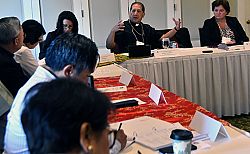Bishop Solis chairs USCCB subcommittee advisory board meeting in Salt Lake City

SALT LAKE CITY — An advisory board to the U.S. Conference of Catholic Bishops Subcommittee on Asian and Pacific Islands Affairs (SCAPA) met in Salt Lake City Aug. 28-29 to discuss how to implement a document approved in June by the bishops’ general assembly.
The document, “Encountering Christ in Harmony: A Pastoral Response to Our Asian and Pacific Island Brothers and Sisters,” calls for the Asian and Pacific Island Catholic communities to bring their gifts “to the service of the entire Church, not just of those communities,” Mar Muñoz-Visoso, executive director of the USCCB Secretariat of Cultural Diversity in the Church, told the advisory board. “You have much to contribute and you’ve been gifted and talented like everybody else, and so the Lord is asking those communities to reflect on those gifts, discover those gifts, and see how you can put them to the service by looking at which areas you can serve and which areas are most needed.”
Muñoz-Visoso was among those who attended the meeting, which was chaired by Bishop Oscar A. Solis, who also is the SCAPA chairman. Bishop Randolph Calvo of Reno, a SCAPA member, participated via conference call. Other participants were pastoral leaders who minister to Asian and Pacific Island Catholic communities throughout United States. Cecilia Motus, former assistant director of the Secretariat of Cultural Diversity in the Church/Asian and Pacific Island Affairs, facilitated the event.
The document intentionally was called a “response” rather than a “plan” because instead of setting specific goals and time lines, it provides a framework for implementation that can be adjusted according to the circumstances of individual communities, Bishop Solis said. “It’s something that is not imposed, but it is something that they can integrate into their own plans” for helping Asian and Pacific Island communities express and engage their faith, he said.
Because the U.S. Asian and Pacific Island communities are so diverse in language, culture and other aspects, the subcommittee members felt that guidelines were more appropriate, Muñoz-Visoso added.
The pastoral response is intended to help diocesan and parish leaders welcome members of Asian and Pacific Island communities and integrate them as “a strong integral part of our Church so that they do not only become recipients of our missionary efforts but eventually become leaders and missionary disciples of Christ,” the document states.
Determining how to disseminate and implement the USCCB statement in U.S. dioceses, Asian and Pacific Island communities, and Catholic organizations was the focus of the advisory group’s meeting.
“The danger is always that this will become one more document, and we definitely do not want that,” Muñoz-Visoso said. “We really want this to guide the efforts of the Asian and Pacific Island communities and to help them make it alive.”
At the meeting, the advisory board developed methods to educate dioceses about the document and help them develop their own plans for reaching out to their local Asian and Pacific Island communities, Bishop Solis said.
Recommendations for doing this included creating educational resources about the document, training pastoral leaders for pastoral ministry in Asian American Catholic settings and formulating a national Asian and Pacific Young Adults and Youth Advisory Committee.
Involving the youth in the implementation of the pastoral response is important, Muñoz-Visoso said, “and they do not want to plan for them, but plan with them.” With the advisory committee, the youth will be able to “put their gifts and talents to the service of the community and the Church,” she added.
At the November SCAPA meeting, the advisory board will present a proposal for implementation of the pastoral response, Muñoz-Visoso said.
© Copyright 2024 The Diocese of Salt Lake City. All rights reserved.

Stay Connected With Us